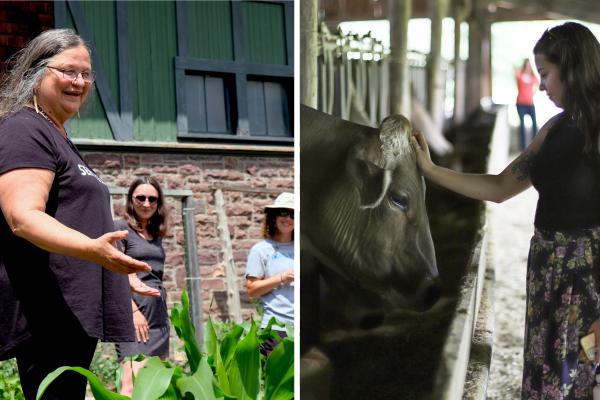At Shelburne Farms, Teams Kick Off a New Year of Farm to School Work Nationwide
It’s a complex – and vital – job to help students untangle how food is grown, processed, and delivered to their plates so that they can understand the impacts of their food choices on themselves and their communities. This July, more than 70 educators, school nutrition staffers, administrators, and community partners came from around the country to Shelburne Farms to prepare for taking on this challenge in the coming school year.
The retreat kicked off the 12th annual Vermont FEED Northeast Farm to School Institute. (Vermont FEED is a partnership project of The Shelburne Farms Institute for Sustainable Schools and NOFA-VT.) Since 2010, the Farm to School Institute has built enduring projects in 100+ schools, districts, and early childhood programs. Throughout the coming school year, these diverse teams – which include classroom teachers, nutrition staff, principals, local farmers, and others – will create and implement action plans with the support of a coach. The goal is to ultimately shift school culture so that all students understand how food choices impact their bodies, the environment, and their communities at large.
New this year, the Institute expanded to support teams from around the country, including Arkansas, Nebraska, Connecticut, Oregon, and Washington, as they adopt this Vermont-born model in their states. This first-ever Institute Adaption Program is a partnership of Vermont FEED with the U.S. Department of Agriculture, Food, and Nutrition Service through a Cooperative Agreement.
Sarah Smith, Nebraska Department of Education Farm to School Coordinator, was part of the team that launched Nebraska's first virtual Institute last year, and was at the retreat to prepare for the state's first in-person program. "Having [the program] already laid out with research-based curricular components and stories of success behind it made it easy to build a case and get buy-in from my state. That isn't to say I don't have a million questions right now, but I know I have a million less thanks to Vermont FEED! Everything we did was based on the Vermont model, including coaching, and it really just made everything feasible for us."
